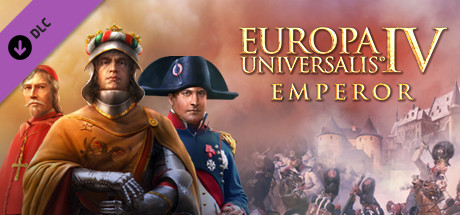Europa Universalis returns to Europe!
Type: Singleplayer, Multiplayer
Genre: Strategy
Developer: Paradox Development Studio
Publisher: Paradox Interactive
Release date: 9 Jun, 2020


Europa Univerasalis 4 has been out since 2013 and over time the game has expanded and evolved a lot. Over the course of now 13 expansions and 3 “content packs”, there’s hardly a thing about the game that has not at least been tweaked since launch. And now it’s finally time for Central Europe to get some time in the spotlight. This region of the game was likely the most fleshed out and interesting when Europa Universalis 4 was first released, but with how much the rest of the world has been improved, it’s almost ended up feeling a bit stale in comparison.
As well as making the area in and around the Holy Roman empire more interesting, this expansion also improves the late game. Pretty much all the changes that are not related to the Holy Roman empire or Catholicism are changes that won’t be noticeable until around the year 1700 or later.
As with every major DLC that Paradox releases, there’s also a free content patch, that makes sure that all the mechanics that ties in with what the DLC adds are up to date and works, and which also adds new things and improves some older things. And the free patch this time around really does a lot for the game.
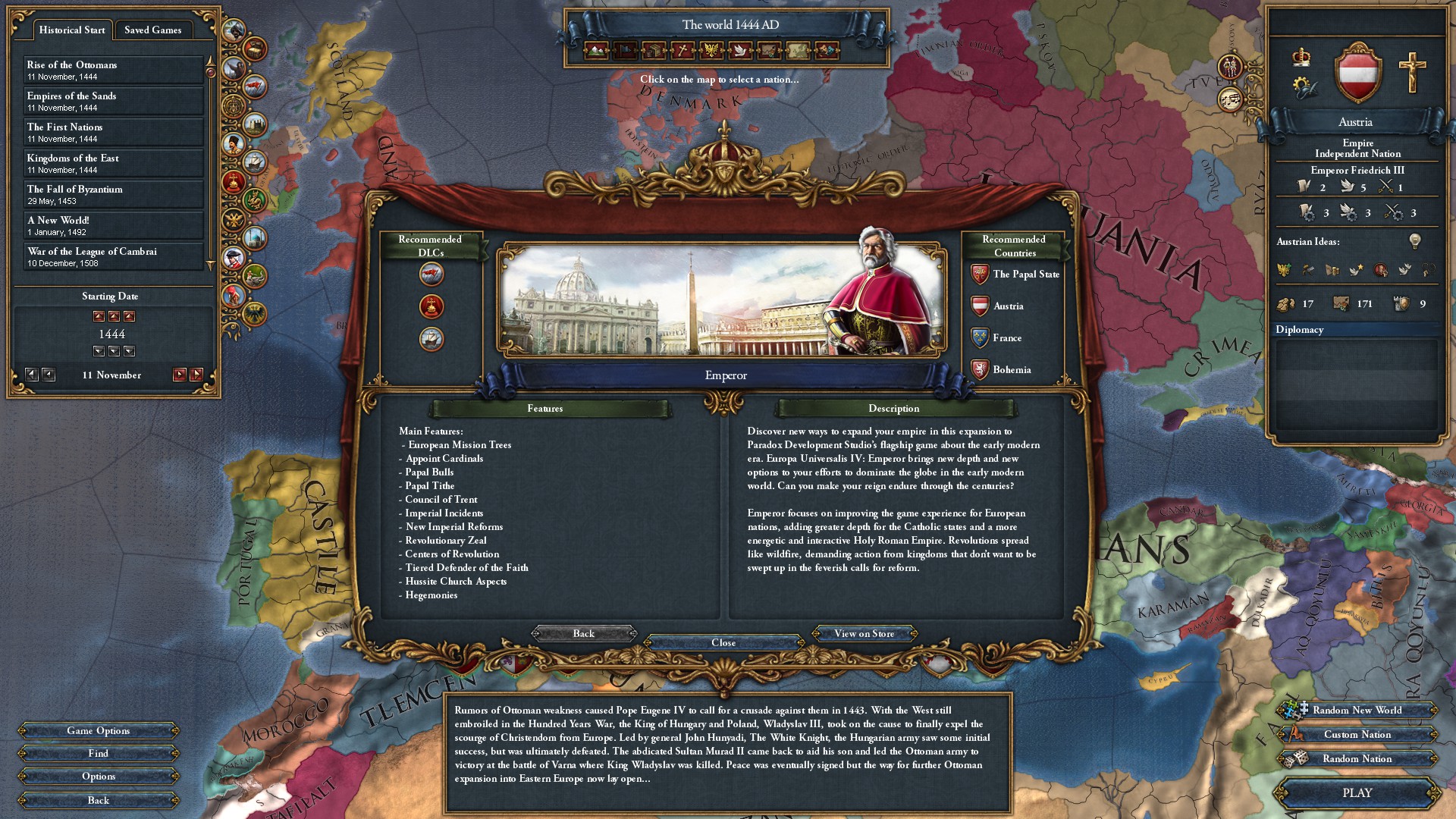
The patch
This review is not for the patch, but it can sometimes be hard to keep the patch content and the DLC apart. And this time around, the changes the patch brings are substantial enough that it really deserves its own segment.
The two most major changes are the changes to the estates and how mercenaries work. The estates are now a bit more abstract, and also more interesting. You no longer assign provinces to them, instead their land ownership is simply a percentage of your nation’s land. You’re also able to issue special privileges to the estates, and there’s a long list of them, all having their own advantages and disadvantages. You can for an example give the burghers a monopoly on a specific trade goods, giving you an upfront cash injection, as well as an increase to mercantilism, at the cost of long term profit from the trade goods that you’re giving them, as well as maximum absolutism. The estate mechanics has simultaneously been easier to manage, and been made deeper.
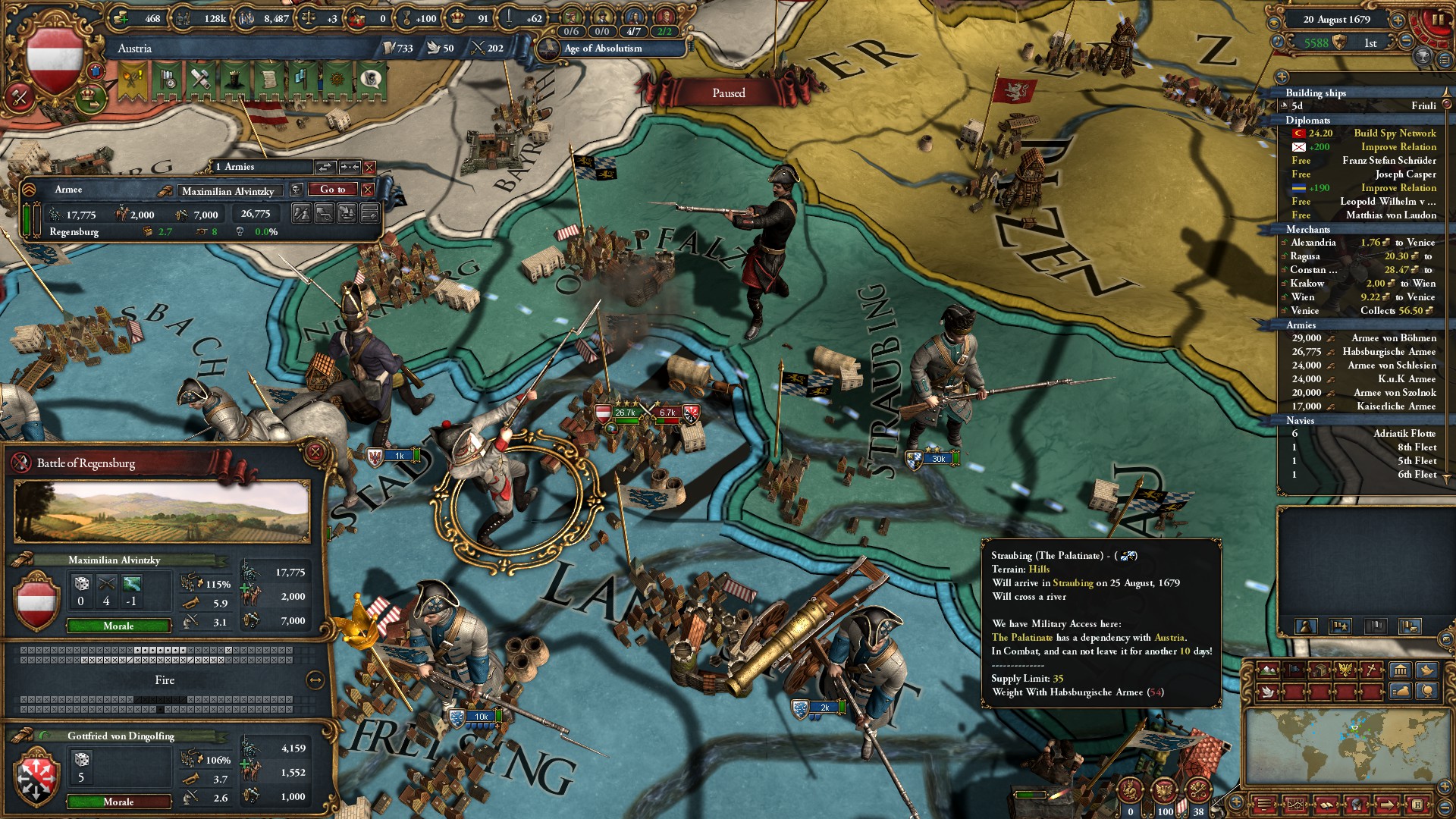
And then there’s the mercenaries. Mercenaries previously just worked like normal units, that you would be able to recruit swiftly, at a high cost, and that would not deplete your manpower pool. Now you hire mercenary companies instead. If you’ve played Crusader Kings 2 then this should look familiar. These companies sometimes come with small bonuses, to represent things they’re good at. Now you can no longer hire 20 units of mercenaries to siege down every single province that the enemy has in one go, instead you need to use your own soldiers to do this, but the mercenaries are still an important part of your army, as running low on manpower is as much of an issue now as it was before the patch, and being able to quickly muster a large force at the cost of a good chunk of money.
These two features will change how every nation is played to some degree, but there’s also a good amount of smaller, nation specific changes. Many nations in Central Europe, as well as in Italy have got new or expanded mission trees, as well as a slew of new events. Bohemia has a new proto-Protestantism religion to deal with in the form of the Hussites.
But most importantly of all, events finally have a go-to button! No idea why that was not a thing before, but it makes it a lot easier to quickly find the affected regions.
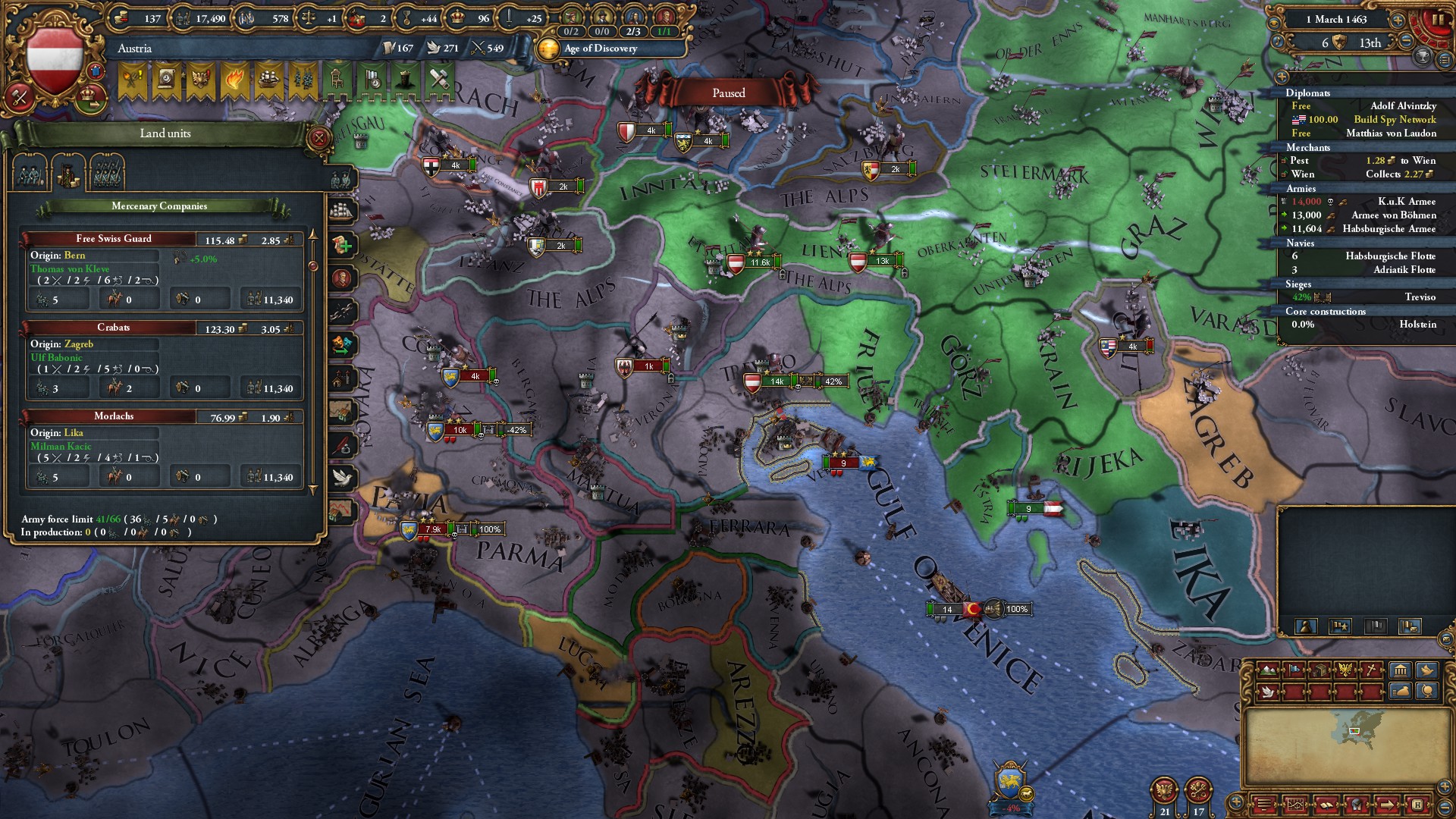
The Holy Roman empire
The Holy Roman Empire, or HRE as it’s often called, has been re-worked to be something a bit more interesting. Many of its nations have got new and unique mission trees, and you’ve now got two new features to deal with. Incidents, and a reform tree that splits into two branches.
Incidents are major events that includes a vote for how to resolve them. If say Switzerland wants to leave the HRE, the states can vote for if you’ll let them, or if you’ll make sure that they stay in the empire, with military force if you have to. These events can cause some strife inside the empire as well, as states will get a relationship penalty for voting differently.
If you’re lucky enough to become the emperor (or just play as Austria and make sure that the electors don’t hate you so much that they dethrone you), you can also enact reforms. Reforms were in the base game, but now you don’t just move ever closer to an inevitable unification of the empire, instead you get to chose between two paths, becoming a centralized and unified empire, or staying decentralized, but making sure that things run more smoothly. Both do of course come with their own upsides, and unifying the HRE might not necessarily be the best idea, even if you go down the centralization route.
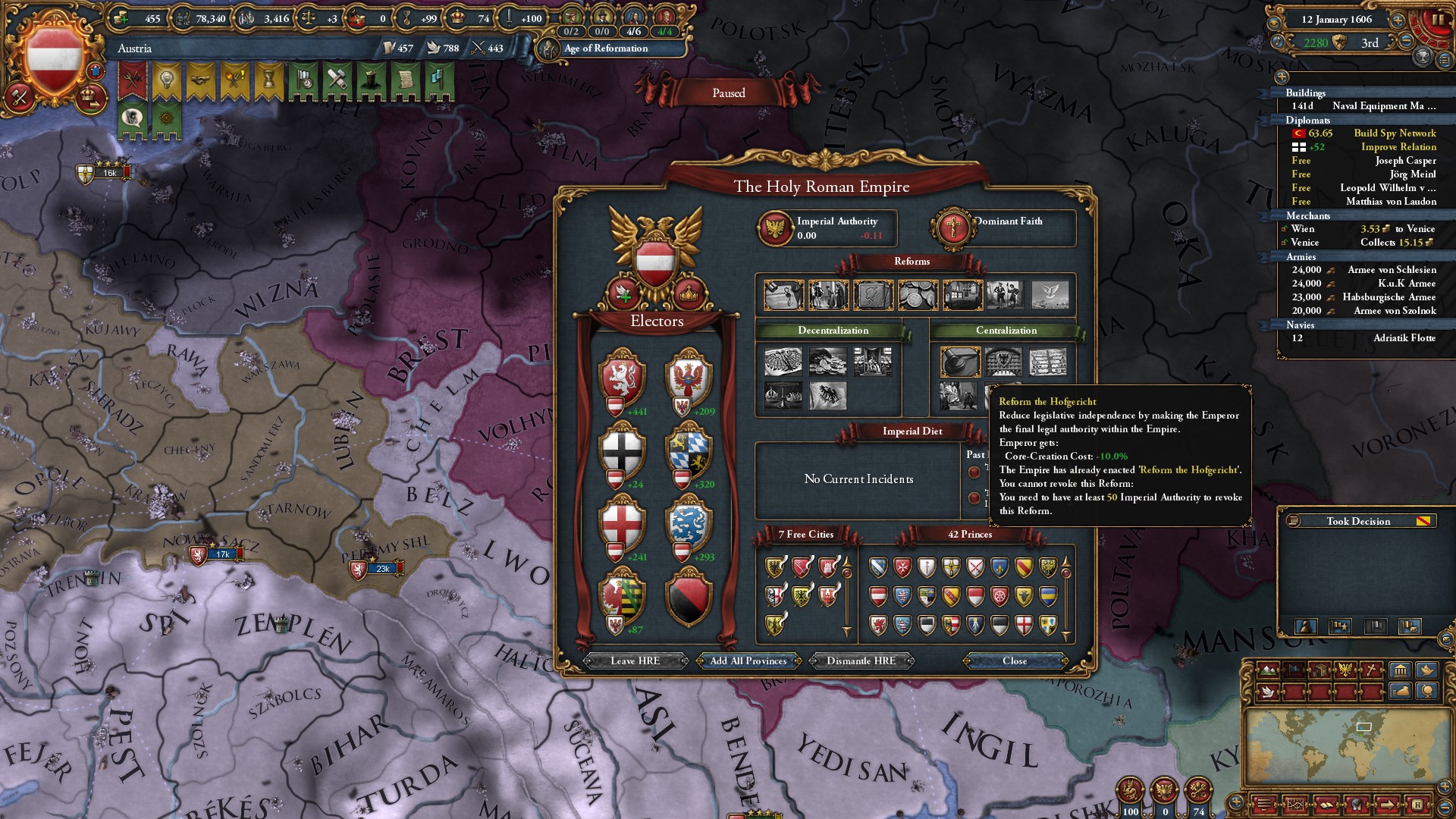
The improvements to Catholicism
Catholicism has for a while now not been the best religion you can have in Europa Univeralis 4. While being the Curia controller was quite powerful, the ability to become the leader of the Catholic world was down to luck, and at best you could improve your chance of owning the Pope. This mechanic has not changed, but staying Catholic is now more attractive than before, as every new pope gets to enact a new Golden Bull, and for as long as that pope is alive, it will remain in effect. These give powerful bonuses to everyone who follows the faith, like lowered aggressive expansion impact, or faster institution spread.
The second big change is the Council of Trent. Once the calls for reformation are starting to become too strong, the council will be called to preserve Catholicism, and members can vote for what will happen, and how strongly you want to deal with these heretical beliefs that are popping up all over the place. The bonuses you get are nothing to sneeze at, but they can also come with the advantage of a massive drop in tolerance towards any reformists (as well as Orthodox and Coptic Christians).
These changes might push Catholicism into being the most powerful religion in the game, or at the very least one of the most powerful, but to balance things out, no nation has the power to chose their own bonuses, instead all Catholic nations have a say in how the faith is developed, and someone wanting to colonize the new world might not have the same ideas about what’s useful as someone who wants to conquer their way to the far east.
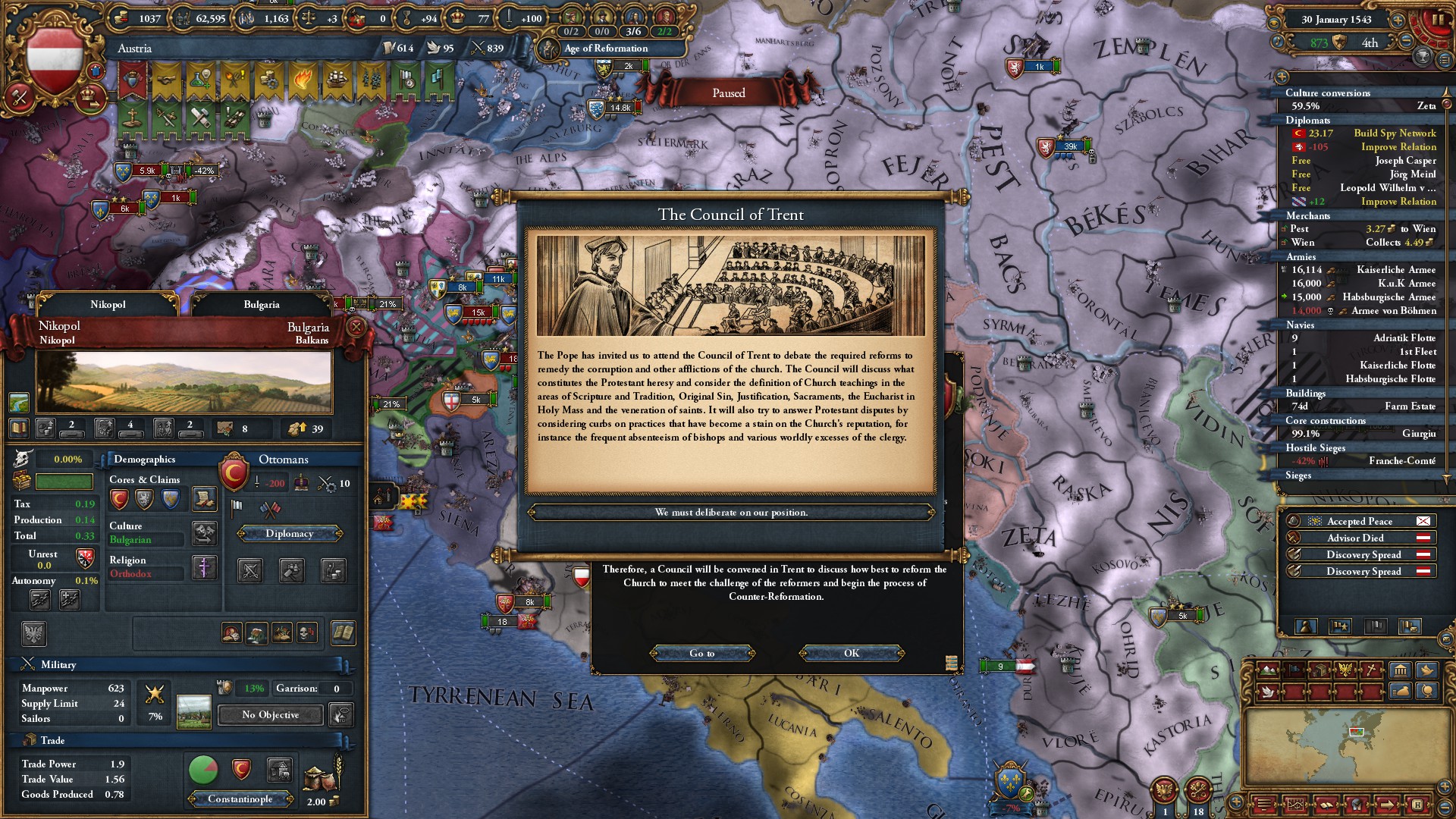
Hegemonies, or the win more mechanic
Hegemonies are an interesting addition to EU4, if for no other reason than it seems to represent a major shift in design philosophy from Paradox. Over the course of Europa Universalis 4’s life there’s been many changes that have been made to make it harder to expand too fast or too much. And here’s a mechanic that does the exact opposite, it gives you a massive power boost, and makes it easier to conquer the world.
There are three kinds of Hegemonies, economic, naval or military. Getting to the point where you can declare a Hegemony is not easy, with the economic one you need to have a massive income (1000 ducats per month), and the military and naval hegemonies are similarly difficult to obtain. Once you’ve declared a hegemony you get a huge power spike, but every other nation gets a -100 relationship penalty to you. Over time you’ll also get even more powerful, as long as you can maintain the requirements to declare the hegemony to begin with.
The hegemonies seem to be something added to make the game less tedious for anyone who enjoys doing world conquest playthroughs. It might also create some true clash of titans in multiplayer matches. For anyone who likes to play smaller nations (at least those who are not already incredibly good at the game), it’s unlikely to have a particularly big impact on the game.
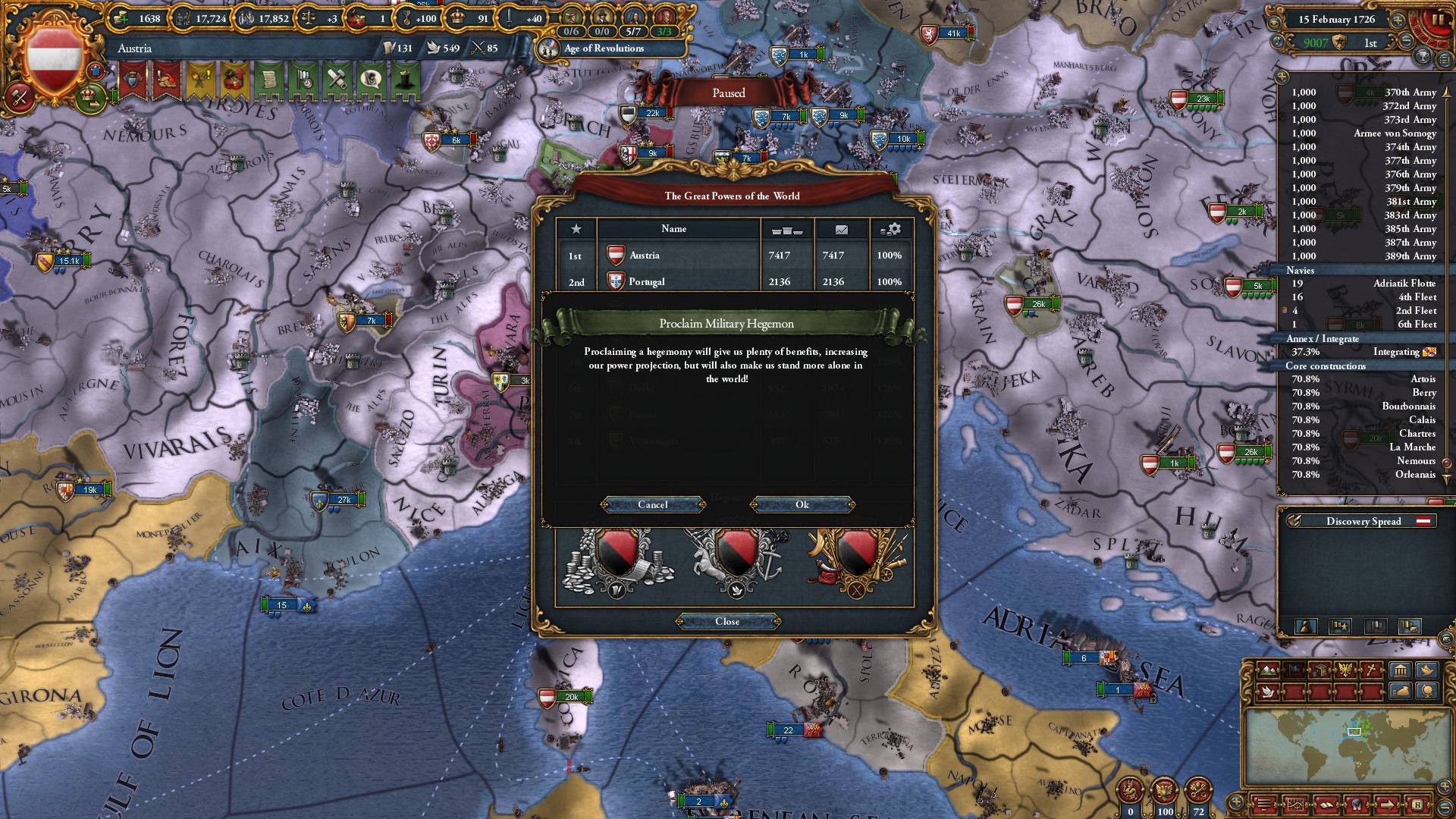
Closing thoughts
You might have noticed that I did not mention one of the touted features of this expansion, the revamped revolutions. I just could not get them to trigger during my time with the expansion, but from Paradox’s own description of the new mechanic, it looks interesting.
Overall, this is a pretty tough expansion to say if it’s worth getting or not. Hegemonies and revolutions are late-game stuff and the changes to Catholicism and the Holy Roman Empire are regional. If you like to play major European nations into the late game, this expansion becomes an easy “save”, but if you mostly play as smaller nations, outside of central Europe (and you’re not one of the few who are good enough to turn even a minor nation into a global power), then you’ll hardly even notice that the expansion is there. So if this expansion is worth getting is entirely dependent on how you play the game. So ultimately I’m going to give this a “save for later”.
There are also some minor features added in both the patch, and the DLC, that I did not mention in the review. These are there, and do improve the game in a bunch of areas, in small but not insignificant ways, but we would be here forever if I commented on every single change.
But the free patch that accompanies it is good enough that even if you’re not interested in anything the expansion brings, now would still be an excellent time to boot up the game. There are a few issues that Paradox will need to sort out, like the AI is not great at working with the new mercenary system, but overall, Europa Universalis 4 is the best it’s ever been.

